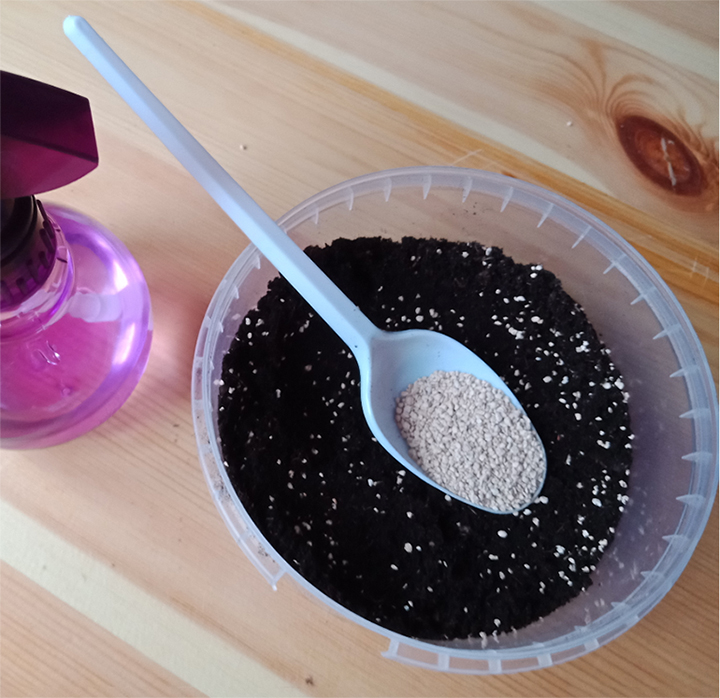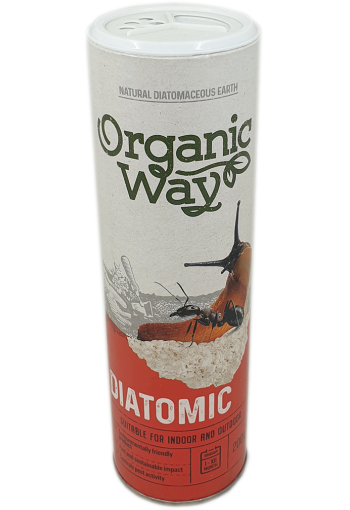Purpose: the product consists of microorganism diatom fossils. Diatomaceous earth is characterized by extremely sharp microscopic particles and the ability to attract large amounts of moisture.
Sharp edges of crushed fossils may damage pest skin, and dried environment may lead to their dehydration. Trying to avoid an environment that is rich in diatomaceous earth, pests are naturally trying to stay away from it. The product is also suitable for use as a soil conditioner or as a substance that helps to retain moisture in the soil.
Use: for pest control, the surfaces of pest pathways, nests, potential burrows, or places where pests gather together are treated with the product.
The product is suitable for use in residential houses, industrial and farm buildings, greenhouses and conservatories, terraces and balconies, outdoor structures.
We recommend spreading the powder in as thin a layer as possible on dry surfaces or around plants, to pour it into cracks, crevices, gaps. Pest contact with dry powder of the product is necessary.
Effectiveness of the product decreases in wet areas.
When used as a soil conditioner, this product has to be scattered on the surface of the soil (100 g/m2) or of a flower pot (trough), and has to be inserted to a depth of 5 cm.
Composition: 100% natural diatomaceous earth.
If the product is stored in dry location protected from direct sunlight, shelf life is unlimited.
Pros and Benefits of diatomite earth powder:
It is absolutely safe for animals and humans, therefore it is used in ecological farming, where the use of pesticides is prohibited.
It does not have a toxic effect on the body and the ability to cause irritation.
Pests die not from poisoning, but from physical damage.
Safe for earthworms and beneficial insects.
When wet, the powder works worse, but once it dries, it is 100% effective again.
Prolongs the effect of watering.
Protects roots from decay.
Harvest ripens 10-12 days earlier.
Increases yield up to 54%.
Despite its similarity to chalk, diatomite is chemically neutral and is not a soil deoxidizer.
Application of diatomaceous earth powder:
Due to its special composition and unique physical properties, diatomite has found wide application not only in the garden, but also in everyday life.
It is a fertilizer and a mineral additive, a cleaning agent and a biological insecticide at the same time.
It is applied for:
insect control at home and in the garden;
plant nutrition with minerals;
improving soil properties;
metal, tile, glass cleaning;
feeding animals and chickens, other birds;
storage of items that require protection from moisture;
performing cosmetic procedures (cleaning and nourishing the skin of the face, hands).

Instructions for use.
Protection against slugs and snails.
Slugs and snails feed on green foliage. They especially like cabbage. In wet weather, up to a dozen crawling pests can be counted on each head of cabbage. Their bodies are very delicate, so they are easily damaged by diatomaceous earth particles. If you scatter a barrier of diatomaceous earth around the beds and individual bushes, your crops will remain intact.
Ants protection.
Ants themselves are harmless to plants. But they breed aphids to feed on their milk. And aphid is a very voracious insect that can destroy a tree or bush in 1-2 weeks. To protect plants from ants and aphids, you will need packaging with a special "Diatomic" perforation. With its help, you can evenly sprinkle the powder on leaves, trunks and shoots. The land around the bush also needs processing. Before pouring diatomaceous earth, loosen it.
Protection against the Colorado potato beetle.
Colorado beetles infect plants from the nightshade family - peppers, eggplants, tomatoes, potatoes. These insects lay eggs on the underside of the leaves, from which the larvae emerge. They feed on the green mass of plants and lead to their death. You can protect plants from the Colorado pest by dusting with powder or spraying with a suspension. To prepare the suspension, you need to take 1 part flour and 4 parts water. The consumption of the drug is up to 2-3 tablespoons per bush.
Diatomite for soil.
Due to the ability to accumulate and release moisture, diatomite powder is used as a soil conditioner - a means to improve the properties of garden soil. As a result, it becomes lighter, breathable and moisture-absorbing. The earth mixed with diatomaceous earth protects plants from drying out even with prolonged absence of precipitation. Fertilizer from diatoms increases soil fertility. It strengthens the roots of plants and increases productivity.
Consumption: 100–125 g of flour per 1 m2. Application frequency - 1 time per year in spring.
Seedling with diatomaceous earth.
In order for all seeds to sprout, it is important to keep the soil moist. If you cover the container with plantings with a film and do not ventilate, mold will form. Therefore, even if seedlings appear, they may die. But if you mix seedling soil with diatomaceous earth in a ratio of 4:1, it will hold enough moisture for sprouts to appear. In addition, it will protect seedlings from fungal diseases (for example, "black leg") and accelerate the survival rate of seedlings when planted in open ground.
Diatomaceous earth for houseplants and garden flowers.
Houseplants need good care. For their good growth, it is important to have air access to the roots and a sufficient level of humidity. Diatomite will also help to provide better growing conditions, make the soil loose and hygroscopic.
It can be applied in two ways: add flour to the soil when transplanting in an amount of 15–20% of the volume of the soil mixture; pour 1-2 tablespoons of diatomaceous earth on the surface of the soil, and then close it up by loosening.
The tool also effectively copes with the destruction of pests of indoor plants. You can sprinkle it on the leaves of plants to protect them from scale insects, spider mites, and aphids.
Composition and physical properties of diatomite.
Diatomite is a light-coloured sedimentary rock with high silicon content. It is mined in the form of diatomaceous earth (kieselguhr), which consists mainly of diatom shells. In the garden, crushed diatomite is used, which is a flour that has a light grey or yellowish colour.
Diatomaceous earth contains a rich mineral composition. The basis of the rock is silicon oxide, which makes up about 75% of the total mass.
The composition also includes:
* aluminium oxide (about 4%)
* magnesium oxide (approx. 1%)
* iron oxide III (about 7%)
* calcium oxide (about 1.5%)
* moisture and other impurities (approximately 11.5%).
Mountain flour from diatomite has a low density (about 0.6 g/cm3) and high porosity, which endows it with the following properties:
* hygroscopicity - the rock easily absorbs moisture
* the ability to absorb and retain odours
* low thermal conductivity - the substance retains heat
* shells of diatoms, which are part of diatomite, endow it with abrasive properties. Therefore, diatomite powder can be used to clean dishes and other surfaces.
* Rigid silicon particles, when they get on the body of insects, cause their death due to damage to the protective layer of the pest and an increase in the intensity of moisture evaporation: the death of pests occurs from dehydration.
Other uses for diatomaceous earth.
In addition to controlling insects, horticultural pests and fertilizing crops, diatomaceous earth is suitable for use in the following applications:
Getting rid of odors. If there is an unpleasant smell in the refrigerator, put a little powder preparation in an open container. Leave it until the smell disappears completely.
If the smell appeared in the shoes, put bags filled with powder in it for 1 day.
Damp protection. Some items need careful protection from moisture. To save them from harmful effects, bags made of dense fabric stuffed with diatomaceous earth will help. They will perform the same function as the bags of silicate balls.
Cleaning surfaces and utensils. The powder can be used to clean sinks, bathtubs, tiles, stoves, frying pans, glass and other surfaces that are not afraid of abrasive cleaning.
Cosmetic application. Diatomite can be used as a scrub and nourishing masks for the skin. Mix a small amount with liquid soap and apply on face. Massage it for 5 minutes and then wash it off. The procedure helps to remove dead skin particles, reduce inflammation, and remove irritation.
* Preservation of seedlings.
The seeds sprouted, the seedlings grew a little, and we planted them in seedling containers, but it’s too early to rejoice. After all, it is important that tender sprouts survive: there are many factors that can destroy them.
Among them are yeast fungi, mould, which often grows on the surface of cups with seedlings, and “black leg”.
Overmoistening is not always to blame for the proliferation of these parasites. The primary thing is that pathogen spores are often already contained in the soil, and sooner or later they can awaken.
We must not wait for this but rather deprive them of the conditions for comfortable living in advance. First of all, you need to water very carefully, using at first not a watering can, but a baby syringe or a syringe with the needle removed.
You should not transplant seedlings into peat pots, especially since now they are made not entirely from peat, but from special, difficult-to-decompose cardboard.
These pots interfere with normal drainage; after a while they become limp and mouldy, turning into a breeding ground for infection. If you later plant a plant in such a pot in the ground, it often soon disappears: the roots rot. The material of these containers is such that it is poorly soaked by rain and may not dissolve in the soil until the fall.
And secondly, it is imperative to preventively fight the infection. But fungicides are not needed at an early stage, and it is not safe to use them indoors.
It is enough to add garden diatomaceous earth to the soil for seedlings. This is a natural material that not only improves the soil and increases the oxygen content in it, but also deprives pathogenic fungi of moisture, and also has a similar effect on insect larvae. So there will be no mould or midges, which are so annoying to seedlings and indoor plants.











